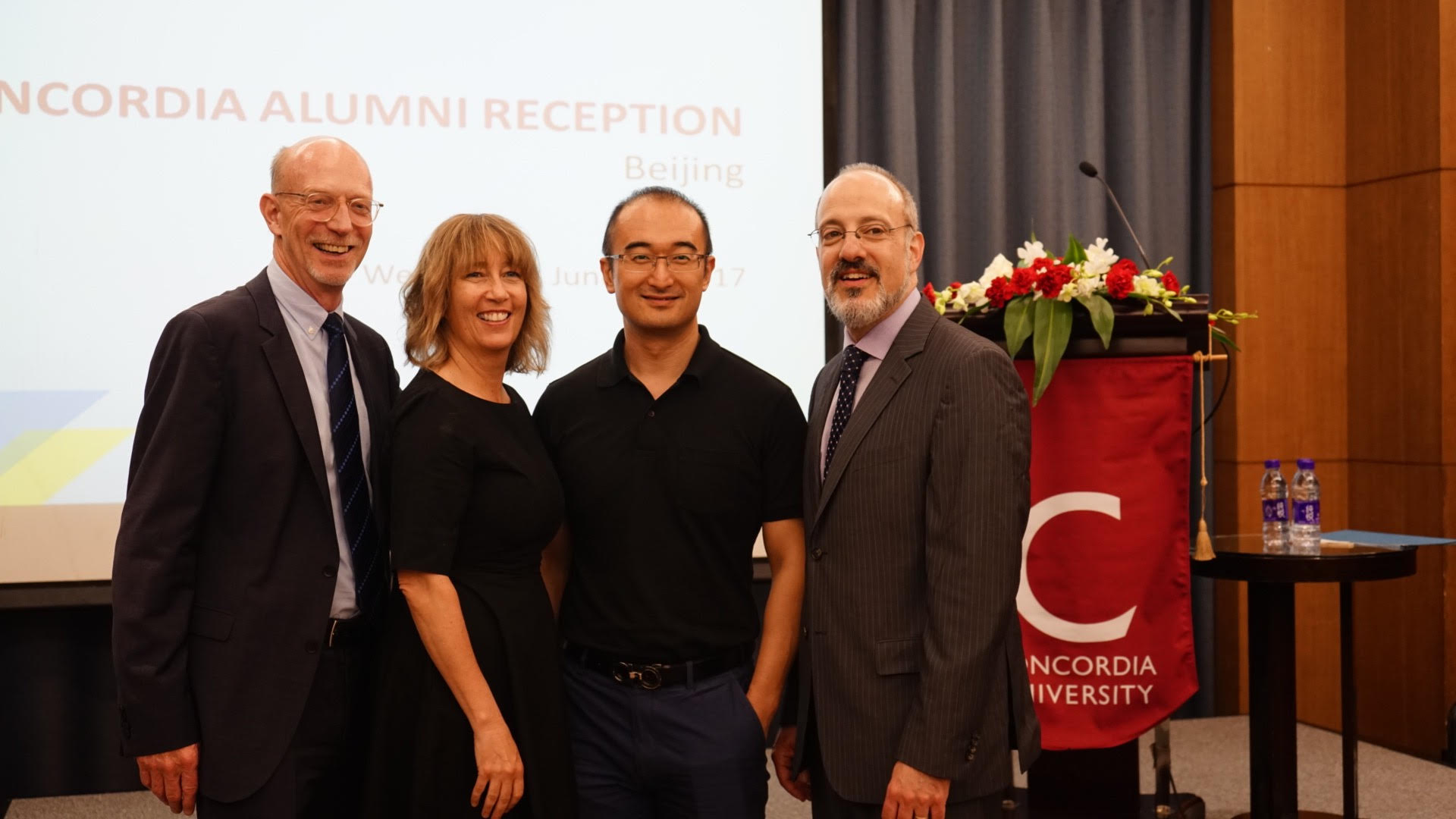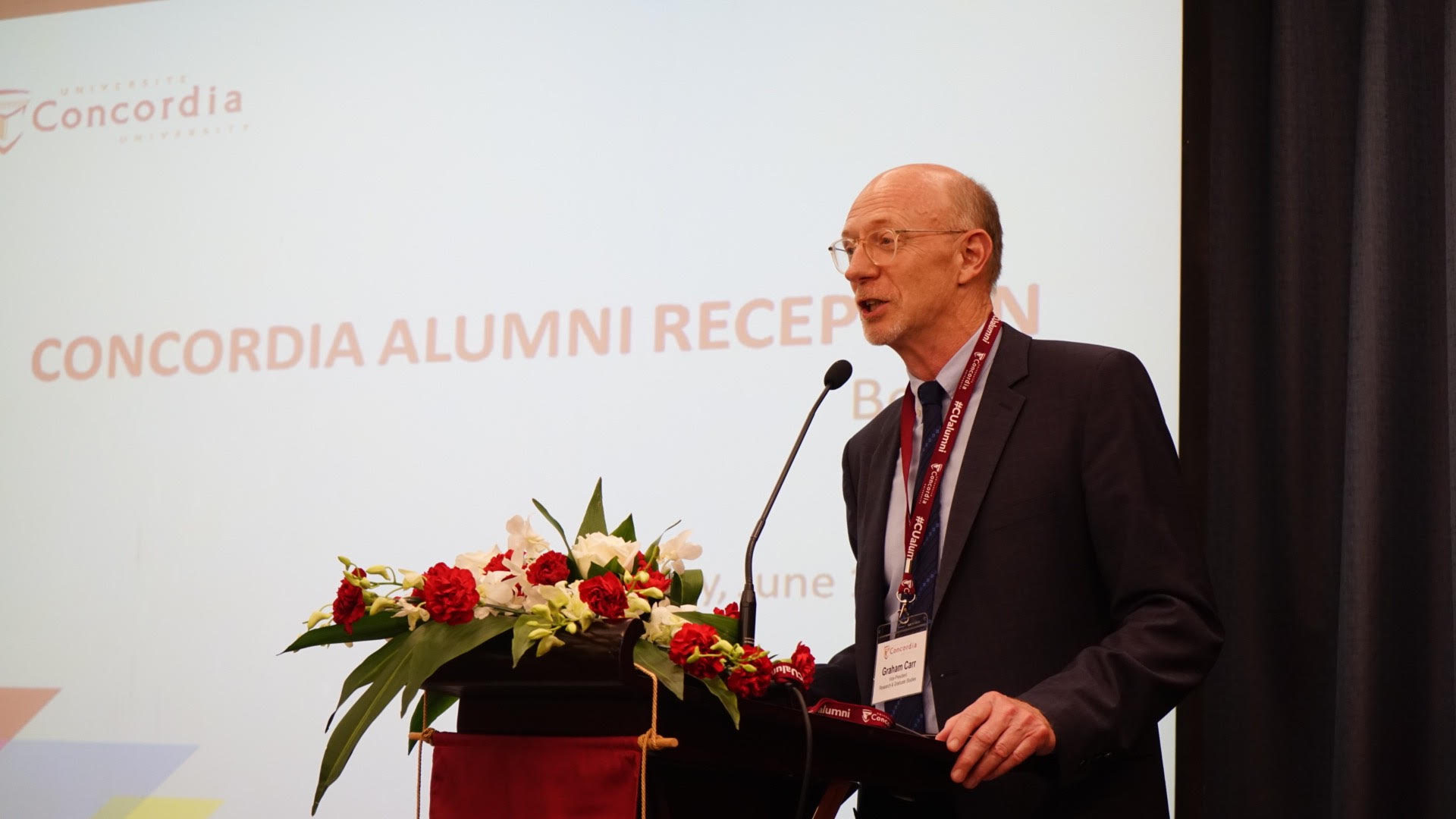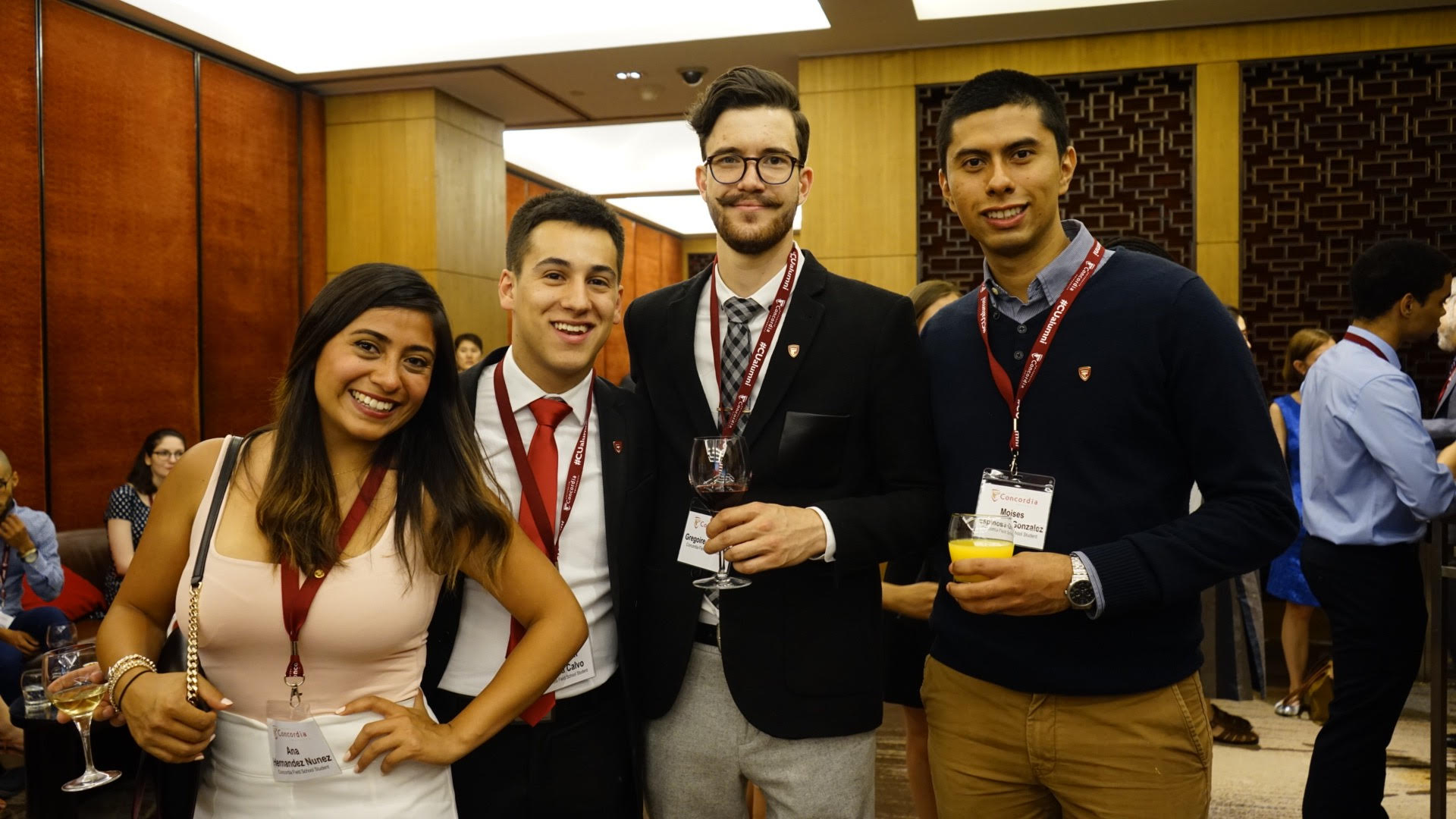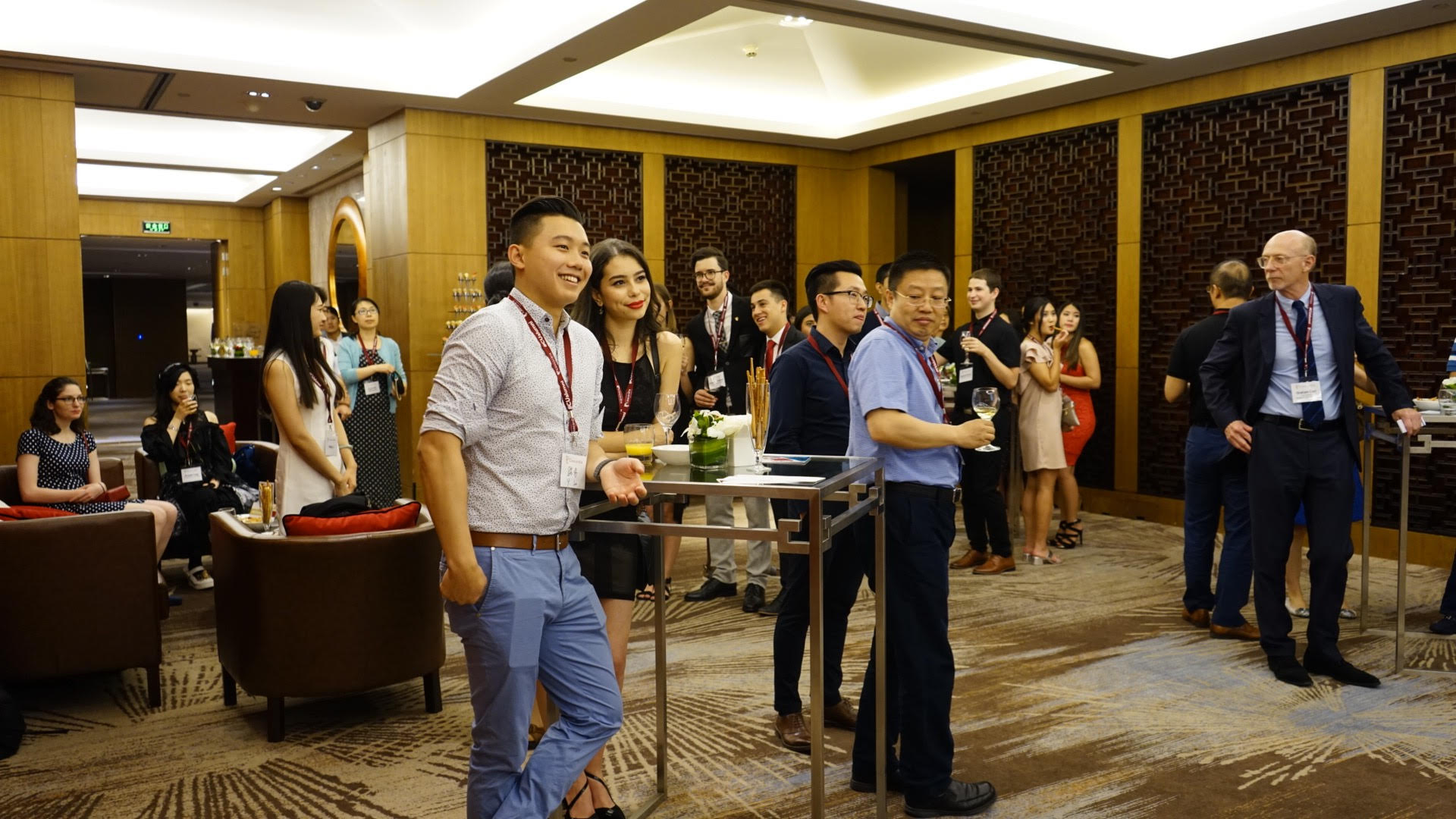A recent reunion in China’s capital offers a glimpse of what former Concordians have to offer.
As the scorching sun set on Beijing’s busy Chaoyang District, about 30 Concordia alumni living in China’s capital gathered at the local Hilton hotel for their annual summer reunion on June 14. Amidst tables of appetizers and drinks, the alumni reminisced about their time in Montreal, and chatted with university administration officials and current Concordia students studying abroad in China for the summer.
The reunion—organized and paid for by Concordia Advancement and Alumni Relations—is one of two official receptions hosted in Beijing every year. The winter event usually includes a visit from the university’s president, Alan Shepard. This reunion, however, began with a visit from Canada’s new ambassador to China, John McCallum. He mingled with the crowd before giving a speech highlighting the benefits of such a gathering. “It is wonderful to have a group like this in China,” McCallum said, referring to the alumni turnout. He departed soon after, leaving most of the attendees feeling a bit in awe.
With over 200,000 alumni spread out over 110 countries, Concordia University prides itself on its vast alumni circle, and emphasizes the importance of strong alumni relations, according to Leisha LeCouvie. LeCouvie is the university’s senior director of alumni relations, and oversees all the events and programs offered to the university’s alumni. The development of Concordia’s facilities and global reputation, coupled with the efforts of the alumni relations department, has made it increasingly easy to draw former students to these events and keep them engaged in the university community, LeCouvie said.
Concordia’s Beijing alumni chapter was founded in 2003 by Chen Zhang and Winston Kan. Now the chapter president, Zhang graduated from Concordia in 1998 with a bachelor of commerce and, later, in 2003, with an master of business administration. “We are very glad that the university supports our activities,” Zhang said. When he and Kan, who graduated with a BComm in 1981, created the chapter, there were only about a dozen alumni involved.

The chapter now gets about 10 to 20 new graduates every year, and its 200 members gather three to five times throughout the year for dinners, picnics and official reunions. Zhang said some members also meet casually for coffee on occasion, and keep in touch through WeChat—a Chinese social app similar to WhatsApp—or via the chapter’s bi-annual newsletter. “It is always a pleasure to meet for annual reunions and see the administration members,” Zhang said as he greeted arriving members with a welcoming smile on his face.
During the reunion, a video created for the gathered alumni was played, featuring current Concordia students from China explaining what they love about Montreal and Concordia, and discussing the differences they’ve noticed between China and Canada. Some of the students expressed gratitude at being offered a scholarship to the university, and many said they were eager to join the alumni chapter after they graduated. The video also included shots of Montreal and the university campuses, which put a smile on more than one face in the crowd. However, nothing compared to the audience’s unanimous “aww” as an image of poutine flashed on the screen.
For Bram Freedman, the vice-president of advancement and external affairs, Concordia’s alumni are like cement to the university’s foundation. They bring new ideas, opportunities, funding and a stronger reputation to the university, he said. This is of particular importance in Asia, with more than 17 per cent of the university’s international students coming from the continent, according to Concordia’s administration. In fact, the university’s first self-organized alumni group was created in Hong Kong 35 years ago.
Beyond reunion events, such as the ones in Beijing, the university offers several alumni programs that allow future graduates to prepare for their professional life. Alumni Matters, for example, is a bi-annual event held at Concordia in March and November. The conference hosts discussions from selected alumni on topics of interest to students, including debt and contract negotiation.
The university also recently developed Go Global, a one-night networking event with Concordia ambassadors, held in 10 cities around the world. Concordia also provides on-campus career services with online programs, webinars and a new chatroom software, Brazen, to connect alumni with alumni-to-be.

“When I say to somebody who graduated in 1980 that the university has now close to 47,000 students, they nearly fall off their seat,” LeCouvie said, expressing her delight at the connection many alumni still have with the university. Freedman shared a similar enthusiasm for alumni reunions. “[Alumni] have warm feelings toward Concordia. I am always happy to reach out and connect,” he said. “They are our best ambassadors.”
According to Freedman, former students often want to give back to their university community, either by becoming mentors, providing work opportunities for current students or making donations to the school. In November, Concordia will launch one of its largest fundraising events in the hope of attracting generous alumni. “Quebec government funds make good universities, but private funds make great universities,” Freedman said, adding that donations from alumni allow the university to expand its facilities and programs beyond what could be done with government funds.
“Alumni can open doors,” said Graham Carr, the provost and vice-president of academic affairs, who also attended the Beijing reunion. As someone who oversees academic life and programs, Carr believes alumni chapters also offer the university a lot of innovation, such as suggesting changes to programs based on their experiences.

Concordia already offers a summer program in China that allows students from all departments to study Mandarin at the Communication University of China in immersion for two months. However, Carr said he hopes to see the development of international partnership programs that allow business and engineering students, for example, to work with companies abroad. During the reunion, Carr spent a lot of time talking to the students studying in China this summer, curious about their opinions and experiences in China so far.
The Beijing reunion offered a glimpse at the possibilities such a large group of international alumni can offer Concordia. Not only can proud alumni help build the university’s reputation in foreign countries through word of mouth, but they also have the opportunity to work with current students to better their own university experience. “The global world is a big place,” Carr said in a speech at the reunion. “We can make it smaller by keeping in touch.”




